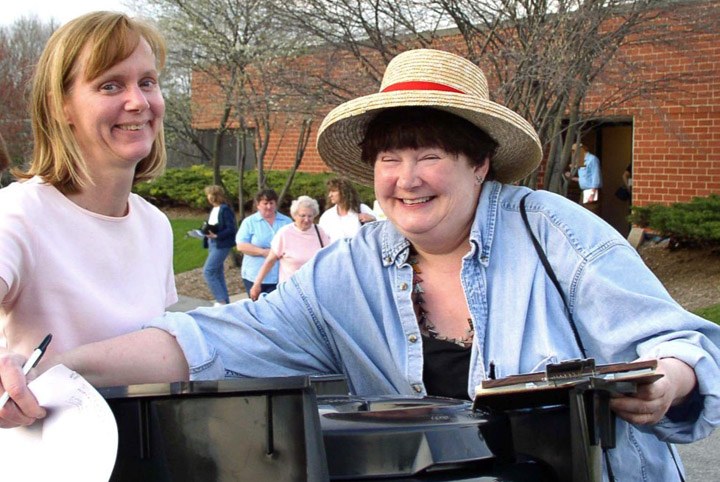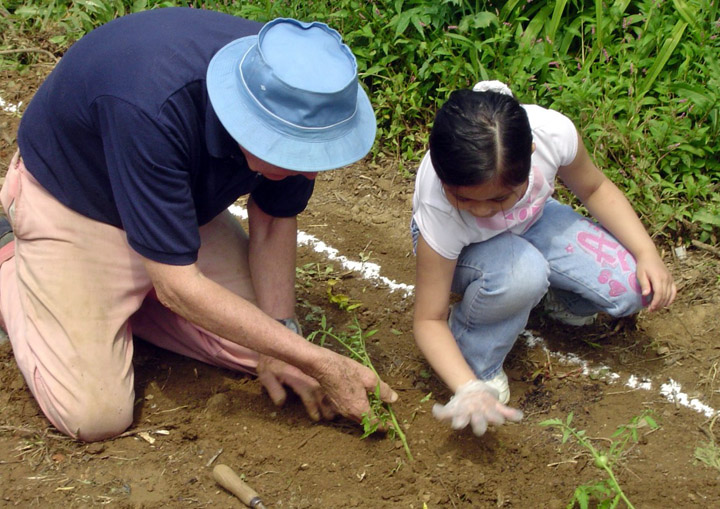Penn State Extension has Master Gardener volunteers in almost every county. Master Gardeners are trained to provide science-based solutions to help people solve their gardening and landscape problems. Through their local outreach, they educate people who are doing gardening projects in many communities. They teach people to grow their own produce and to use pesticides carefully.

Reaching More Pennsylvania Residents
Landscaping. Gardening. Growing food. Protecting our natural environment. Pest management. Pennsylvania residents make many decisions about these issues in their home gardens, and act on them every day.
By making wise decisions they can improve their own financial well-being and support businesses in their communities. Families can also improve their health through the exercise of gardening, by growing nutritious produce, teaching the next generation and contributing to a healthy planet.
Economics of Gardening
In 2010, ornamental horticulture cash receipts totaled over $356 million, making it the number three crop in Pennsylvania, according to the USDA. The horticulture industry also provides many jobs to meet the consumer demand.
Gardening is one of Pennsylvania residents' favorite pastimes. Families spent an average of $351 on gardening and landscaping in 2011, according to the National Gardening Association.
Dedicated Volunteer Workforce
In 2012, there were almost 2,000 Master Gardener volunteers in Pennsylvania. Collectively, they reported working 119,306 hours as volunteer educators across the state. They reported reaching 4.3 million Pennsylvania residents with their helpful advice. Their contribution of time is worth an estimated value of $2.5 million.
First Detectors
Master Gardeners are trained and prepared to help as first detectors of invasive pests such as the emerald ash borer.
Trustworthy Advice for All
Master Gardeners are available throughout Pennsylvania to help residents avoid making costly mistakes in their home gardens.

How do Master Gardeners Help Individuals and Communities?
- Answering gardening questions
- Speaking about gardening topics
- Holding gardening workshops
- Providing educational displays at local events
- Demonstrating new plants and gardening practices
- Assisting with Penn State research
- Teaching youth about gardening
Encouraging Composting
In a partnership with the Pennsylvania Department of Environmental Protection, Penn State Extension developed a statewide backyard composting education program. Master Gardeners held composting workshops throughout the state, and participants in the workshops received a free composting bin. To date this program has offered nearly 600 workshops in 64 counties and over 20,000 composting bins have been distributed.
In 2012, Bucks County Master Gardeners expanded on this program by demonstrating composting methods, holding on-site classes and developing an attractive educational brochure. Their efforts diverted over 60 tons per year of household food and yard waste from landfills.
Contributing to Research
Master Gardeners helped conduct research projects in 23 counties, contributing to our understanding of pollinators, vegetable and flower varieties, sweet corn insect pests, and reintroduction of the American chestnut.
Garden Questions Answered
Master Gardeners maintained a garden helpline in 39 counties. They reported 17,236 contacts with people who sought this service via telephone, email or visits to the county office.

Master Gardeners Teach
- In 153 schools, 108 community gardens and 44 special needs communities
Master Gardeners Speak
- 1,015 speakers' bureau talks
- 656 lecture style classes at symposiums or lecture series
- 135 radio, TV or Internet spots
Master Gardeners Write
- 684 articles published in a newspaper or blog
- 2,815,923 people reached by the newspapers
- 276,913 visited the blogs
Master Gardeners in the News
- 421 news articles, radio, TV or Internet spots were published about their projects
Master Gardeners Host
- 52 one-day seminars and multiple-day courses were hosted by Master Gardeners

